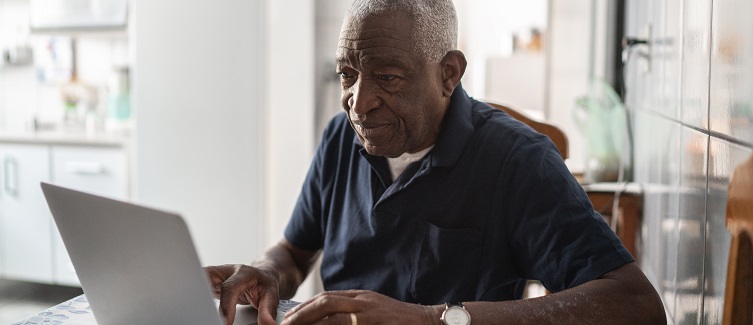For decades, efforts to find a cure and raise awareness about breast cancer have been literally colored pink. But breast cancer is not a health care concern exclusive to women.
Many men who develop breast cancer miss or ignore the early warning signs, said Shannon Puhalla, MD, assistant professor of medicine and director of the Breast Cancer Clinical Trials Program, UPMC Magee-Womens Hospital.
Learn more about the breakthrough treatments for breast cancer at UPMC Hillman Cancer Center.
Never Miss a Beat!
Subscribe to Our HealthBeat Newsletter!
Thank you for subscribing!
You can now select the specific newsletters you'd like to receive.
You are already subscribed.
Subscribe to more newsletters in our email preference center.
Sorry, an error occurred. Please try again later.
Get Healthy Tips Sent to Your Phone!
Facts About Breast Cancer in Men
Dr. Puhalla covers the basics about male breast cancer and sets the record straight about misconceptions surrounding the disease.
Q: How common is breast cancer in men?
It’s pretty rare. About 0.5 to 1 percent of all breast cancers happen in men. That’s about 2,500 cases a year in the United States.
Literature does suggest that the incidence in men is increasing. It’s probably in part related to lifestyle. In particular, obesity and lack of exercise are emerging risk factors for male breast cancer, as well as female breast cancer.
Q: What are some concerns around breast cancer in men?
One of the concerns with male breast cancer is that because men don’t get screened with mammograms, it’s not necessarily on their radar.
Often, men present with breast cancer at a more advanced stage. You are not picking up cancer on mammograms early like you are in women when it’s small. You’re waiting until you can actually feel something.
The important public service message is: If a man does feel something in his breast tissue or on his chest wall, he needs to bring it to the attention of his physician.
Q: Where does breast cancer usually develop in men?
It usually happens behind the nipple and feels like a lump or a hard marble. If it hurts, it can be cancer; if it doesn’t hurt, it can be cancer. So, the presence or absence of pain doesn’t definitively rule in or rule out cancer.
When breast cancer spreads, it spreads to the lymph nodes located in the armpit. Sometimes, men and women will actually feel the mass in the armpit instead of the breast.
Q: What causes breast cancer among men?
It’s relatively similar to the issues we see with female breast cancer, which is related to estrogen exposure.
For instance, men can have something called Klinefelter syndrome, which is a genetic abnormality, a chromosomal issue that changes estrogen levels in men and predisposes them to breast cancer.
Some inherited gene mutations have been linked to breast cancer. These mutations can be passed to you from either parent and can affect the risk of cancers in both women and men, such as BRCA.
Q: How exactly does obesity contribute to the risk of breast cancer among men?
There are now data that shows us that fat cells, in essence, can produce estrogen or lead to a high estrogen environment, which can then stimulate breast cancer cells to grow.
Q: What are the treatments for men who develop breast cancer?
Most men will have a mastectomy (removal of the breast tissue). Men can also have a lumpectomy, which is just removal of the lump itself. That’s the first step.
The second step is preventing the recurrence of cancer. We can treat men with chemotherapy if they need chemotherapy, and also with hormonal treatment.
Q: What are other challenges you face helping men battle breast cancer?
Women can usually find other women at work, or in their community, who have had breast cancer. For a man who has breast cancer, the only people he may know who have had breast cancer are women. I think there is a sense of isolation for men who have breast cancer.
UPMC is part of a consortium that is trying to help to characterize male breast cancer by following patients over time. It’s called the Translational Breast Cancer Research Consortium.
It’s important that we participate in that. We see about 1,300 new cases of breast cancer a year. About 1 percent of those are going to be men, and we see those men in our practice.
Find more information by visiting the UPMC Hillman Cancer Center website or check out our Medical Mondays segment on Breast Cancer.
About UPMC Hillman Cancer Center
When you are facing cancer, you need the best care possible. UPMC Hillman Cancer Center provides world-class cancer care, from diagnosis to treatment, to help you in your cancer battle. We are the only comprehensive cancer center in our region, as designated by the National Cancer Institute. We have more than 70 locations throughout Pennsylvania, Ohio, and New York, with more than 200 oncologists – making it easier for you to find world-class care close to home. Our internationally renowned research team is striving to find new advances in prevention, detection, and treatment. Most of all, we are here for you. Our patient-first approach aims to provide you and your loved ones the care and support you need. To find a provider near you, visit our website.
